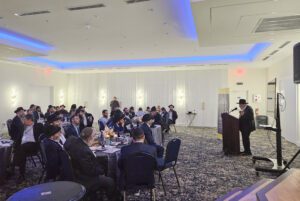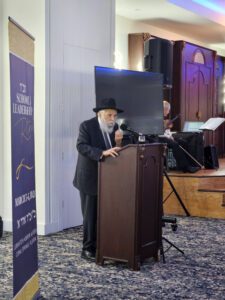A letter from our director and founder to the Lipskar family.
Dear Lipskar Family Shyicheh,
Growing up, I didn’t have much to do with Rabbi Lipskar. Of course, I knew his name, but it wasn’t personal. My first real encounter was during my time in New York in 1997. I was working as a waiter at Gan Yisroel, and Rabbi Lipskar was there to speak at the Yarchei Kallah. He spoke with such passion, such optimism, and such clarity about the Rebbe’s leadership and how the Rebbe was working through each of us, impacting the world.
He made you feel that you belonged to something so much greater—a movement that was powerful and purposeful. At a time when so many of us were grappling with confusion and uncertainty, his words were like a lifeline. Listening to his shiurim, hearing him explain deep Torah concepts with such simplicity—it was inspiring. And, of course, everyone knew of the shul he built and the community he created in Bal Harbour—a model Chabad house, a pilot for others to emulate.
Years later, in 5768, I founded the Menachem Education Foundation to strengthen and elevate Chabad chinuch. I began traveling to Florida regularly for fundraising and would always stop in Bal Harbour. I must have visited over fifty, maybe sixty times, but not once did I meet Rabbi Lipskar. It wasn’t until two years ago that our paths finally crossed.
At the time, we were knee-deep in developing a social-emotional learning curriculum. We had based it on mainstream science, attempting to align it with Torah principles, but it just wasn’t working. I remember driving back from a meeting in Boca, feeling like the entire curriculum had fallen apart. Nothing was clicking.
I was scheduled to meet a dear friend, Mendel Pinson, in Bal Harbour. That day, one of our mutual friends mentioned wanting to meet Rabbi Lipskar. Mendel suggested we just go up to his office and ask. So we did. That meeting was a turning point.
During that conversation, Rabbi Lipskar shared a message that struck me deeply. He said he once asked the Rebbe about integrating science with Torah. The Rebbe told him, “With an open heart, you can find every single answer in Torah.”
For us, that was the message we needed to hear. It wasn’t enough to align our curriculum with Torah—we had to root it in Torah. We scrapped the entire program and started again from the ground up. And, baruch Hashem, it’s been successful ever since.
At that same meeting, he shared another story. He told me that he once had the opportunity to receive a significant grant to conduct a large study and make a major impact—or to start small with a modest sum and create a pilot project. The Rebbe told him:
“Kol D’pashut Malie Tifhie—Keep it simple. Start as a pilot.”
And that’s what he did. He started The Shul in Bal Harbour, and he was so proud to say that it became a model—a pilot for a thriving community that many have since emulated.
From that encounter, a true relationship developed. Last winter, I invited Rabbi Lipskar to speak at our annual principals’ retreat. He graciously agreed. He arranged his own transportation, didn’t ask for a fee, and brought his full heart and energy to the event.
His message was simple yet profound: “With so much information at our fingertips, the most important thing we can give our children is connection.” He emphasized that while knowledge is abundant, genuine relationships are rare. And as educators, our primary focus must be on creating those connections. It is through relationships that we can build strong character and prepare the next generation to fulfill their mission.
The message resonated deeply. Attendees came up to me afterward, saying, “Rabbi Lipskar really hit the spot.” But the most powerful feedback came from my 15-year-old daughter, who was there as our event photographer. She told me, “Rabbi Lipskar was the oldest person there, but he connected the most with our generation. He really gets us.”
A few weeks later, I saw him at a l’chaim in New York. I shared what my daughter had said, and he immediately said, “Please ask your daughter what she thinks the solution is to connect with today’s youth.”
When I told her, she was floored. The fact that Rabbi Lipskar—a man so successful, so wise, and so revered—wanted to know what she thought? She felt seen. Valued. That was Rabbi Lipskar—a general who saw each individual. A leader who made every person feel they mattered.
This brings to mind the teaching in Pirkei Avos (6:3):
הַלּוֹמֵד מֵחֲבֵרוֹ פֶּרֶק אֶחָד …. אוֹ דִבּוּר אֶחָד אוֹ אֲפִלּוּ אוֹת אַחַת…. קְרָאוֹ רַבּוֹ אַלּוּפוֹ וּמְיֻדָּעוֹ
“One who learns from his friend one chapter… or one word, or even one letter… calls him his teacher, his general, and his guide.”
The Rebbe explains the value of even one letter: When you grasp the essence of an idea, that essence becomes the foundation upon which everything else is built. It multiplies. It grows.
That’s who Rabbi Lipskar was—a general, a mechanech, a builder of people. He gave us that one foundational message: Keep it simple. Stay rooted in Torah. Focus on connection. And from that simple yet powerful advice, we’ve been able to build and grow.
His impact lives on—in our work, in our values, and in the generations he inspired.
המקום ינחם אתכם בתוך שאר אבלי ציון וירושלים.
With deep respect and heartfelt condolences,
Zalman Shneur, Executive Director & Founder Menachem Education Foundation





